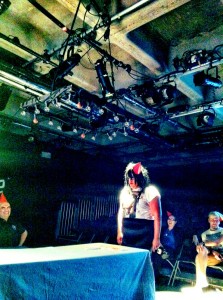Amy Lamé’s ‘party-slash-show-slash-party’ Unhappy Birthday ties the forced entertainment of the birthday party – compulsory hats and party poppers – to the gnawing obsessiveness of fandom.

Scored to Morrissey’s back catalogue, the show revolves around a game of pass-the-parcel where the reward for winning is being pulled by Lamé onto the stage. It’s not so much audience participation as the refusal to let us sit as dumb voyeurs, performance art re-ordered for the Fringe: ‘This would be durational but they charge me for every five minutes I run over’. In any case, I find myself drinking a can of Red Stripe and listening to pre-recorded instructions that guide me through the recipe for Eau du Moz: milk, teabag, lager, Old Spice, whisked lightly. I think I’ve found my calling.
Though the threat of participation makes it hard to pretend you’re anywhere but at the party, Unhappy Birthday centres on Lamé’s willingness to trash herself: even as she harasses members of the audience to help her create commemorative wall-art from panty-liners, it’s a preface to planting herself, face-first, into her own birthday cake. There’s a beautiful sequence as she spins across the room, stomach out, before emerging from under her own shirt, glasses slightly fogged. She freezes, eyes shifting around the room, a hint of cake on her neck: did we see her doing that? Did she go too far? Are we still with her?
Later, Lamé slashes at her hair with scissors before pausing and – almost beatifically – lifting the ragged wig from her head. Calm for a moment and then frantic, face-coating hairspray and back-combing for a Moz-like quiff gives you Lamé simultaneously in drag as herself and as Morrissey. Has Lamé always, already looked like him? It’s an experience not so much about the performance of failure as commitment despite itself: Lamé tells the story of the one time she met Morrissey at an autograph signing, when he asked her to leave the room. Another inversion: the show works through Morrissey’s absence as guest of honour: ‘Love you! Hate you! Come close! No, stay away!’.
Is this a queer work? Maybe. There’s an aesthetic that traces from Duckie and director Scottee, maybe an acknowledgement of the work you need to do to stage yourself, and desire. Recognising a friend, Lamé attempts to hook him up with the man opposite. It’s partly a joke, but mainly not. There are queers in attendance here, checking each other out; when the bare light-bulb grid drops to form the outline of a mirror, she’s just not looking at herself, but at us too.